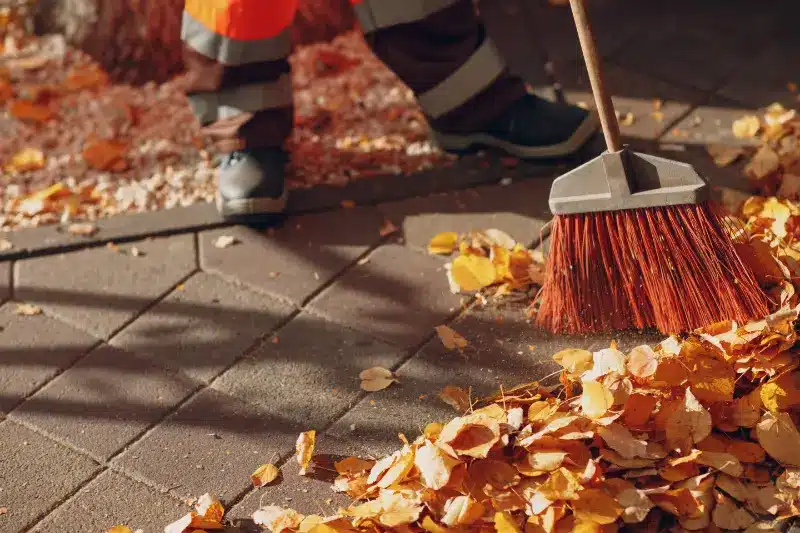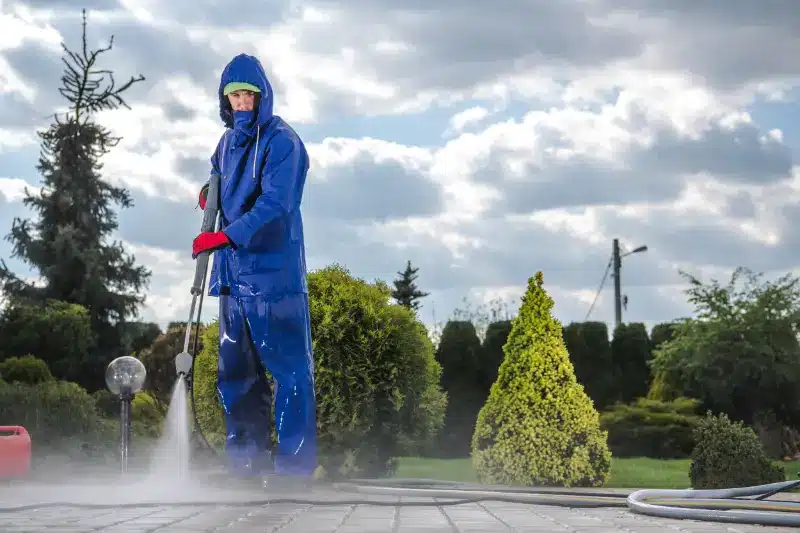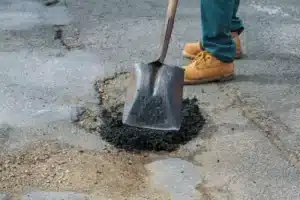Concrete may seem indestructible, but it has a weak point: water. The elements can gradually wear down concrete, leading to structural damage like cracks and spalling. That’s why many people wonder if sealing concrete will make it waterproof. The answer is not simple, but this guide aims to explain the science behind concrete sealants and how they can protect against moisture and enhance appearance. Sealing concrete is not just a good idea; it’s an essential part of proper maintenance. This guide is your roadmap to understanding and implementing concrete sealing techniques that will last. Whether you’re a DIY enthusiast or looking for professional services, this comprehensive guide has got you covered.
What Makes Waterproofing Essential for Your Concrete Surfaces?
Waterproofing sealer helps protect your concrete surfaces from surface damage, corrosion, and staining. However, it’s important to understand that while sealants cannot make concrete completely waterproof, they can significantly improve its water repellency. This distinction is important when choosing the right product that will act as a barrier against water penetration and the damages that come with it. By preventing water from passing through, sealants can extend the life of your concrete surface, preserving its structural integrity and appearance. The benefits of using waterproofing products are significant, as they can help prevent costly repairs and ensure the property maintains its value over time.
Can the Right Concrete Sealer Make a Difference?
Finding the perfect concrete sealer can be a challenge since not all sealers are the same. Factors like the level of exposure to the environment, the amount of traffic, and the desired finish are important. Different types of concrete waterproofing sealers offer unique benefits for different applications. It’s important to make an informed decision when choosing a sealer that meets your specific needs. Whether you need a sealer for a basement floor that is prone to moisture or a patio that is exposed to sunlight, the right sealer can work wonders and help to reduce the permeability of concrete.
Types of Concrete Sealers
Concrete sealers are essential in protecting concrete surfaces from damage. There are various types of concrete sealers, each with specific features and applications. Here are the most common ones:
Penetrating Sealers
Penetrating sealers are specially formulated to protect exterior concrete surfaces against moisture, deicing chemicals, and other external elements that can cause corrosion and freeze-thaw damage. These sealers, such as silanes, siloxanes, silicates, and siliconates, penetrate the concrete to create an invisible chemical barrier, preserving the natural appearance of the concrete. They are particularly effective in outdoor exposure conditions and allow moisture vapor to escape, making them breathable.
Acrylic Sealers
Acrylic sealers are a type of protective coating that creates a thin layer on the surface of concrete. They can be either water-based or solvent-based and are suitable for indoor and outdoor use. Acrylic sealers are easy to apply and are also cost-effective. They offer good protection against water and chloride intrusion. These sealers come in different levels of sheen, with solvent-based versions providing better color enhancement compared to water-based products.
Polyurethane Sealers
Polyurethane sealers are a great option to protect your concrete surface from scuffs, stains, and abrasions. They offer excellent durability and create a high-build film on the surface, which makes it perfect for high-traffic areas. These sealers are available in both solvent- and water-based formulations. They are twice as thick as acrylic sealers and provide a transparent, non-yellowing finish that can enhance the appearance of colored, stamped, or exposed-aggregate concrete.
Epoxy Sealers
Epoxy sealers are a type of protective coating that creates a durable, hard, and abrasion-resistant finish. They are ideal for high-traffic floors and cement-based overlays. These sealers typically consist of two components that need to be mixed before application. They offer excellent water repellence but may be yellow when exposed to UV light. It’s important to note that they are best suited for indoor use.
DIY Guide: How to Apply Waterproofing Concrete Sealer Like a Pro
You’ve decided to take the plunge and seal your concrete yourself. Fortunately, with the correct tools and approach, applying a waterproofing sealer can be straightforward. Here are some tips:
Prepare the Area
- Clean the Surface: Begin by sweeping or blowing away all debris, dirt, and dust from the concrete surface. For stains, grease, or mildew, use a concrete cleaner to ensure the surface is thoroughly clean. For extremely dirty surfaces, a pressure washer may be necessary.
- Dry the Surface: Ensure the concrete is completely dry before applying the sealer. This might require waiting a day or two after cleaning, especially if you’ve used a pressure washer or if weather conditions are humid.
- Repair Cracks: Fill any cracks or holes in the concrete with a suitable concrete filler or repair compound and let it cure as per the manufacturer’s instructions.

Choose the Right Sealer
- Type of Sealer: Select a sealer based on the concrete’s location and exposure. For exterior surfaces, choose a sealer that offers UV protection and can handle weather changes. For interiors, consider a sealer that is safe for indoor use and compatible with foot traffic.
- Finish: Sealers come in various finishes, from matte to high gloss. Choose one that fits the desired aesthetic of your concrete surface.
Application
- Apply the First Coat: Pour the sealer into the paint tray. Using a paint roller or sprayer, apply the sealer evenly across the surface. Start from one corner and work your way to the other side, making sure to cover the entire area without leaving puddles or dry spots.
- Let It Dry: Allow the first coat to dry according to the manufacturer’s instructions. This could take anywhere from a few hours to overnight, depending on the product and weather conditions.
- Apply the Second Coat: For added protection, apply a second coat of sealer, especially on high-traffic areas or surfaces exposed to harsh weather. Apply in a perpendicular direction to the first coat to ensure even coverage.
- Curing Time: After the final coat, wait for the sealer to fully cure before using the surface. Curing times can vary, but it’s typically at least 24 hours before light foot traffic is allowed and up to several days for full cure.
For those seeking professional finesse without the DIY hassle, Matt The Driveway Guy stands ready to assist. His team specializes not only in applying waterproofing sealers to perfection but also in diagnosing concrete health and recommending the best course of action for your space.
Professional vs. DIY Waterproofing: When to Call in the Experts
While attempting to waterproof a property on your own can give you a sense of accomplishment and save some costs, there are situations where it is better to hire professionals. For instance, when dealing with detailed projects or large-scale applications or simply ensuring a job well done, seeking expert services is the way to go. That’s where Matt The Driveway Guy comes in. We are a team of trusted professionals in the Greenville area, well-known for our expertise in concrete sealing, which guarantees a top-notch waterproof barrier and an immaculate finish. By choosing our specialist, you can rest assured that your property is in safe hands and that the job will be done to a professional standard.
Maintaining Your Seal: How to Keep Your Concrete Waterproof Over Time
Waterproofing your concrete with a sealant is not a one-time solution. It requires regular maintenance to ensure that it stays impervious to water over time. You should inspect the sealed areas periodically for any cracks or signs of wear and apply the sealer again as recommended by the manufacturer. Consistent care, such as cleaning and treating stains as soon as possible, will not only maintain the integrity of the sealer but also the fresh, clean appearance of your concrete. This kind of diligence will protect your investment and keep your property looking its best.

Frequently Asked Questions
Q: What should I use to make my concrete surface waterproof?
A: You should use a liquid waterproofing product specifically designed for that purpose, such as a concrete waterproofing sealer or a terrific waterproof sealer.
Q: Is it true that concrete is naturally porous?
A: Yes, concrete is permeable by design, making it susceptible to water penetration if not properly sealed with a concrete sealer.
Q: Can I find suitable waterproofing materials for building surfaces?
A: Yes, there are various materials available in the market, including sealants and waterproofing products, that can be applied to surfaces in your home or building to prevent water damage.
Final Thoughts
Applying a concrete sealer is a wise decision as it not only waterproofs your concrete surfaces but also enhances their appearance and prolongs their lifespan. Whether you decide to take on the task yourself or seek professional help from Matt The Driveway Guy, sealing your concrete is a smart investment for your property in the long run. If you’re located in Greenville and considering sealing your concrete, don’t hesitate to contact Matt The Driveway Guy at (864) 420-4172 or visit our website for expert guidance and friendly service that will secure your concrete. Get in touch today!






